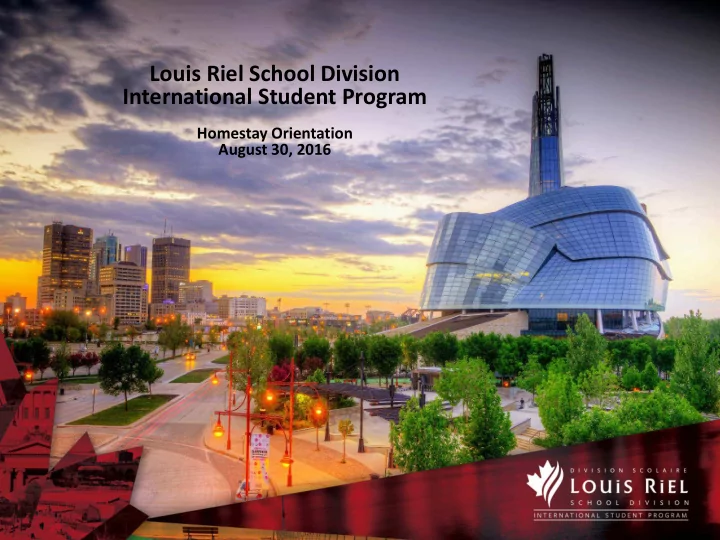

Louis Riel School Division International Student Program Homestay Orientation August 30, 2016
Hosting Terminology • Custodian Children who are less than 18 years of age and studying in Canada without a parent or legal guardian must be cared for by a responsible adult (Canadian or Permanent Resident) in Canada. LRSD will assume custodianship of minors in our homestay program. • Guardian Permanent legal caregiver of a child; birth parents or appointed by court. • Homestay Provide private room, food, guidance, cultural experiences and daily care.
Expectations from Homestay Families • Help the student to feel at home - be their family • Understanding/acceptance of different culture • English and/or French Speaking (or other languages) • Supportive, caring, positive family life • Patient and open minded • Tour of home, show them how everything works
Expectations from Homestay Families • Invite students to join you in activities/outings • Show them some of the city highlights • Take student to the doctor when needed • Contact school if student will absent from school “Treat them as you would want your own children treated by a family in another country.”
Expectations from Homestay Families • Ongoing interaction with student • Provide 3 meals a day and reasonable snacks • Provide a clean and tidy living environment • Fully furnished room (bed, study area, dresser, alarm clock) with a door and window (Compliance with Safety Code) • Available when needed Student cannot be left • alone overnight • Internet access (WiFi) • Key/access to home • Laundry facilities
Support from ISP staff • Homestay/Student Orientation • Monthly follow-ups with Families • Weekly school visits • Host Family/Student Expectations Handout • Emergency Contact - 24/7 • Ongoing communication with biological parents, agents and schools
Who Signs What? Custodian School related issues, LRSD will inform biological parents of any issues • Health emergency and hospital care, LRSD will inform biological parents • of any issues Homestay Permission for school-based day/field trips • Act on behalf of biological parents/custodian in • emergency situations until ISP staff is contacted Student Terms and Conditions Contracts • Disclose Student Information •
Who Signs What? Biological Parents Permission of high risk • activities form online Permission to Travel • Any document requiring • financial responsibility Terms and Conditions • Extra-curricular activities if • waivers are required Safe Grad •
What kinds of things should the student pay for? • All clothing • School supplies • Personal toiletries • Medicines/medications of all kinds • Independent entertainment and expenses when going out with friends, etc. • Costs associated with participating in school activities such as graduation ceremonies
What kind of expectations should you have for the international student? • Respecting/understanding Homestay and ISP rules/expectations • Attending school everyday • Letting you know where they are at all times • Respecting family guidelines regarding table manners, use of household appliances, laundry, shower time, restriction on computer use, etc. • No alcohol, drugs, driving a motorized vehicle, or holding a paying job • Planning ahead for social plans/sleepovers/curfews
Problems that a student may experience • Jet Lag • Difficulties with communication/language or culture • Homesickness • Loneliness • Mood swings • Peer pressures • Being overwhelmed • Cultural/lifestyle differences
Within your family • Confidentiality • Inform ISP of any changes with your family (pets, health, contact information, etc…) • Become familiar with cultural differences (food, greetings, hugging, bathroom etiquette) • Ongoing verbal communication
International Students are part of the family celebrations!
Talk to your student everyday!
Yes you can…. • Use your best judgement when needed: • call 911 for emergencies • say “No” if you are uncomfortable with the student’s plans • Treat them as niece or nephew • Refer to ISP rules when necessary
Resources for Homestay Families Health Insurance • International Student Program Orientation • ISP Student Handbook • Going Home End of Program Checklist • Sick Days Information • Winnipeg Transit Guide /Winnipeg Transit • Navigo Cell Phone and Internet Use • Divisional Calendar 2016-17 • Permission to Travel • Homestay Do's and Don'ts • Homestay Food Do's and Don'ts •
Please check with us if you unsure about anything. (Problem-solving, signing forms, travel requirements, accidental damages, advice, etc.)
Website: isp.lrsd.net Resources for Homestay Families https://www.lrsd.net/schools/ISP/Homestay/Pages/Resources-for- Homestay-Families.aspx Photo Gallery http://www.lrsd.net/schools/ISP/Students/Pages/Gallery.aspx Social Media http://www.lrsd.net/schools/ISP/Students/socialmedia/Pages/defa ult.aspx Feel free to send us photos and testimonials!
Enjoy the journey of hosting your international student! Create lifelong memories!
Recommend
More recommend